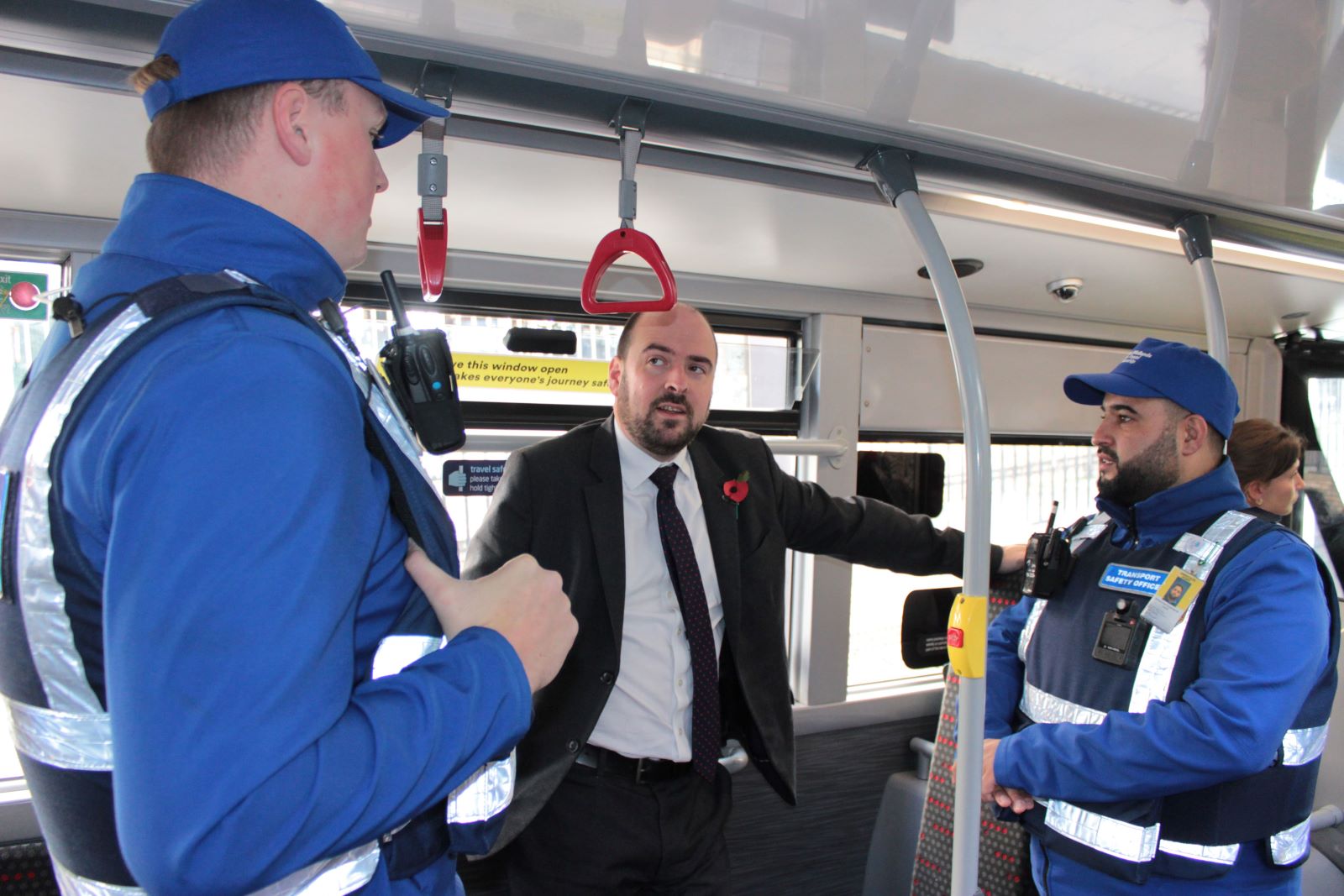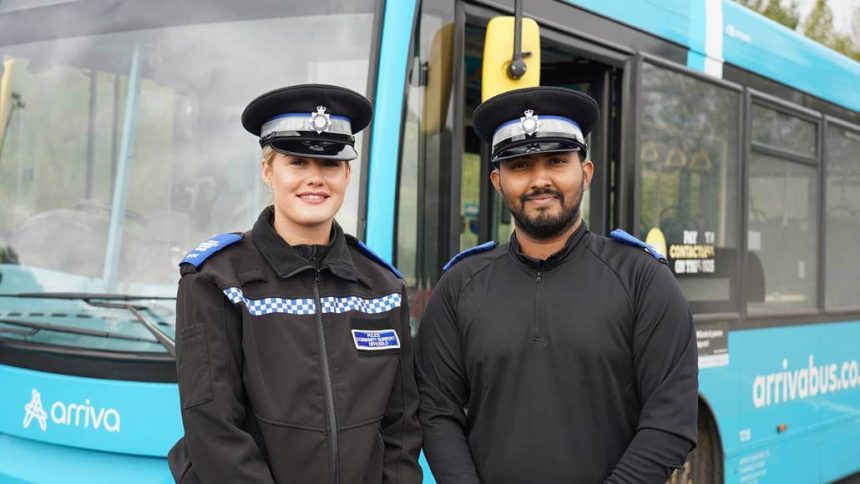Crime and antisocial behaviour (ASB) on and around buses has been making headlines recently, but operators and local authorities are fighting back. The topic was even raised in the Scottish Parliament last month when the Young Persons’ Free Bus Travel Scheme was linked to an increase in misconduct.
On that occasion, Conservative MSP Graham Simpson cited the Scottish Government’s “Behaviour in Scottish schools: research report 2023”, which noted that the ability of under-22s to travel for free on buses had “in some cases, led to young people travelling to other areas of the city to take part in fights or meeting up on buses and engaging in anti-social behaviour”. The Scottish Government was asked to consider removing the free travel entitlement from offenders. Also referred to were statistics from Lothian Buses, which has cited a doubling in the incidence of antisocial behaviour between 2019 and 2022.
Transport for London’s “Six-month crime and anti-social behaviour” report, published last month, painted a mixed picture. Although the crime rate per million passenger miles for April-October 2023 matched that from the same period in 2022, the levels of reported theft, violence, public order offences and robbery were “higher than expected”. In particular, violence was 6% higher than in 2022. The report said public transport crime rates are broadly in line with wider trends.
However, Bus Service Improvement Plan (BSIP) funding is increasingly being used to pay for personnel to patrol bus networks. Further, in November, the Department for Transport announced £2.5 million in funding for pilot schemes which would place Transport Safety Officers on patrol across public transport on buses, trains and trams in four areas of England.
Lothian’s issues and solutions
Willie Hamilton, Lothian Buses Operations Director, believes the young person’s travel scheme is beneficial as far as modal shift and increasing patronage are concerned and tells routeone: “We really are talking about a small percentage of bus users that are creating these issues.”
However, he adds: “Unfortunately, that small percentage really do have a significant impact on other bus users, which is counter to the modal shift if it continues at those rates. But, also, we have drivers now who are scared to go to work on some shifts and in some areas — we need to find a way to combat that working together.”
He admits that it is difficult to identify exact causation for the doubling in antisocial behaviour numbers. But he says Lothian is soon to finalise crime data for 2023 and it is expected to show an increase again of about 80% versus 2022.

Mr Hamilton believes incidents are being reported now which wouldn’t have been reported around a decade ago. “This is good because that’s how we can combat it and work with local authorities and police to start to understand some of the habits,” he says.
He highlights several measures which Lothian has taken to try to combat the problem. He mentions, in particular, that the operator has a police liaison officer, whose salary it pays towards. It also has a CCTV manager.
Lothian Buses says it also carries out school visits to help with educating youngsters about dangerous behaviour. It also has a trauma risk incident management for staff who experience such incidents.
“Partnership working, for me, is the key as you can’t do any of this stuff on your own,” adds Mr Hamilton. “Whether it be government, bus companies, local authorities or the police, the key is to continue partnership working and look at ways to evolve.”
WYCA using PSCOs
In November, the West Yorkshire Combined Authority announced it would use £1m of BSIP money on deploying 15 full-time Police Community Support Officers (PSCOs) across the county’s bus network and other measures to increase passenger safety.
Alison Lowe, West Yorkshire Deputy Mayor for Policing and Crime, says the scheme has already been a success, with arrests have been made. “Most people behave when they see someone in a uniform and that in itself is a success,” she says.
Using West Yorkshire’s MCard app, passengers can report where they are feeling unsafe and the data can be accessed by police within 24 hours so that officers can target problem areas.
As well as 24-hour CCTV monitoring, the programme has funded help points at all stations and all bus staff have been trained in conflict management.
West Midlands’ ‘success’

BSIP has also funded, since February 2023, the deployment of eight Transport Safety Officers (TSOs) in the West Midlands. The collaboration between Transport for West Midlands (TfWM), West Midlands Police and the British Transport Police added to three officers who had been in place since 2021.
Michael Sandland, TfWM Transport Safety Officer Manager, says: “While still in its early stages, the programme has already yielded positive results. Our officers spend on average 80% of their time patrolling our public transport network. During 2023 they interacted with over 200,000 people and issued over 6,000 warnings. Our proactive approach not only addresses immediate issues but also acts as a deterrent, creating a safer environment for everyone.
“The benefits of a safe and secure public transport system extend far beyond mere statistics. Enhanced safety encourages ridership, particularly among vulnerable groups like women and children who may feel hesitant to travel alone. Increased public confidence in bus services also bolsters economic activity and promotes a more vibrant and connected community.”
Among other local projects, Northumbria Police has introduced a “Trojan” bus, which appears to be a regular bus service but is carrying only plain-clothes police officers.
Lothian Buses notes work with the Confederation of Passenger Transport (CPT) has been useful. CPT Operations Director Keith McNally says: “Bus operators place passenger safety at the top of their priorities in the services they provide. Bus services play a vital role in the community, with more than 10 million passengers travelling every day, making it the most popular form of public transport.

“Of the very small minority of services that experience anti-social behaviour, operators always act decisively to ensure the safety of their passengers and staff. In some cases, this means services being temporarily diverted while the incidents are investigated. CPT and operators continue to liaise with local transport authorities to ensure services can continue to be provided for the community with minimal disruption and in the safest environment possible.”
Among several linked campaigns, Bus Users UK has worked with Women in Transport to publish an action plan for operators and local authorities aiming to improve safety on public transport.
In connection with Aberystwyth University’s “Gender+ Bus” project publicised last year, researchers from the establishment this month said they were now working on identifying an operator to help with piloting a driver training programme to boost safety for women and other passengers on buses.



























